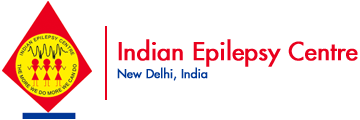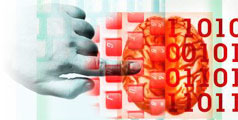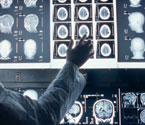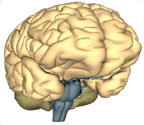
PLEASE CALL: 011-41614141
& 45695542
(Between 11:30 AM - 5:30 PM)

 |
FOR APPOINTMENTS PLEASE CALL: 011-41614141 & 45695542 (Between 11:30 AM - 5:30 PM) |
 |
Ask Your DoctorI would be glad to answer any of your queries, please mail your problem at info@indianepilepsycentre.com.Q. I have 14 year old child who has had a spells during which he became unconscious and had generalized shaking and jerking, frothing at the mouth and lost control of his urinary bladder. He was diagnosed to have seizure. What is a seizure and what causes it? A. Our brain consists of millions of nerve cells, or neurons, and their supporting structure. Each neuron maintains itself in an electrically charged state. It receives electrical signals from other neurons, and passes them on to others. All the functions of the brain, including feeling, seeing, thinking and moving muscles depend on electrical signals being passed from one neuron to the next in an orderly way. During a seizure, this order is disrupted by some neuron discharging signals inappropriately. There may be a kind of brief electrical "storm" or “short circuiting” arising from neurons that are inherently unstable because multiple reasons including genetic defect (as in the various types of inherited epilepsy), or metabolic abnormalities such as low blood glucose, or alcoholic binge. Alternatively, the abnormal discharge may come from a localized area of the brain (this is the situation in patients with epilepsy caused by head injury, or brain tumor). The abnormal electrical activity of the brain has to come out and gets manifested in various forms depending upon from where it is originating and what other areas of the brain get involved in the process. The clinical manifestation of this abnormal activity is called a “Seizure” and be in the form of convulsions (jerking of limbs) with or without altered consciousness, blank staring with altered sensorium and even complex behaviour and automatisms. Seizure is a symptom and not a disease. Just as fever is a symptom of infection, likewise seizure is a symptom of brain irritability/injury due to any cause. Q. I had 2 episodes of seizures and was diagnosed to have epilepsy by my physician. Which all tests are advised for the evaluation? A. In order to find the cause for a seizure, an electroencephalogram (EEG) and MRI scan of the brain are usually advised. During an EEG, the brain's electrical rhythms are monitored by electrodes placed on the scalp. More meaningful is EEG during both wakefulness and sleep. Most of brain rhythm abnormalities are evident during drowsiness and early stages of sleep. The epileptogenic abnormalities if present can not only provide evidence in favor of seizure, but also help in suggesting the most likely cause and possible treatment for the same. The EEG of the brain is in many ways similar to the ECG of the heart. MRI looks at the structure of the brain, and picks up any structural abnormalities which if present can explain the cause of the seizure. Seizure protocol MRI is an special MRI in which very thin sections of temporal and frontal lobes of the brain are obtained to look for rare abnormalities that if present can not only explain the cause for the seizure, but would also influence treatment. Q. I have been diagnosed to have epilepsy and currently on medications for the same. Will my seizures stop after a course of 2 years? A. Whether a seizure would stop or not depend up on the cause for the seizure. The medications to stop seizures are purely symptomatic, that is they suppress only the disorderly electrical activity of the brain, but not the cause for the same. If the cause is not removed then the seizure may recur after stopping the medications. If the patient doesn’t have seizure for a period up to 2-3 years on medication, then in some cases we can presume that the cause for the seizure has probably resolved and a trial of stopping the medication can be considered. Q. My brother is 24 year old and has been having recurrent seizures since past 15 years. He has tried at least 6 different medications and currently on 4 without relief. He has 2-3 seizures in a week at present. Is there any other effective treatment available? A. If a person has tried 2 or more seizure medications at good dose without full benefit, then the chances that any other medications either single or in combinations would make a difference are not more than 10-15%. So, in such cases, Epilepsy surgery as a potential treatment needs to be considered. If after necessary investigation, a patient is found to be a good epilepsy surgery candidate then the chances for cure of his seizures are as high as 90 %. Q. My 16 year old sister is having almost every day spell, which has been labeled as psychological by her doctor. Is there a way by which the diagnosis could be confirmed? A. The most reliable way the diagnosis could be confirmed is to do Prolonged Video-EEG monitoring study. During this, the patient in hospital is kept under video camera and at the same time undergoes continuous brain wave (EEG) and heart rhythm recording. The typical spell is captured on the video camera. The EEG and ECG during the spell are analyzed to confirm the diagnosis. |
Myths & Facts  |